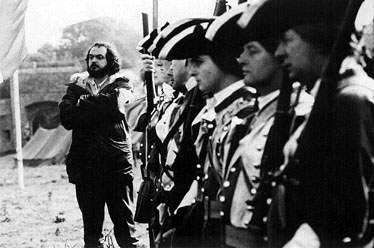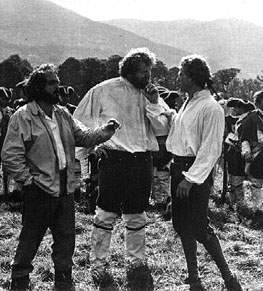 3
3
Barry Lyndon3

Stanley Kubrick
Barry Lyndon is one of the greatest films of all time, and anyone who says otherwise is a deadbeat. Often, the first thing people complain about is the music. They, deadbeats, say it’s not really top notch classical music. I couldn’t agree more. The song that runs through the Barry meets Lady Lyndon scene reminds me of a slowed-down, heavy-handed outtake from Beethoven’s much maligned Triple Concerto. Meanwhile, the music in the bandaged child scene is like a watered-down version of the momentous adagio in Beethoven’s Seventh. And this is precisely Kubrick’s genius. By using only the heavy outlines of great music, he is able to harness the emotional power of it while not actually providing the great music itself, with all its complexity and unabridged depth. The music, therefore, does not compete for your intellect and there is no risk of a mismatch—a huge white Hermitage with soft, raw oysters, a delicate Mosel with confit d’oie. Tragedy—avoided. In fact, if Kubrick had used Beethoven’s Emperor Concerto, with its gentle curves and quietly sublime melody, it could have gotten ugly fast; the film would have simply to stop every few minutes and let the girl pass.
One of Kubrick’s themes (yes, only Kubrick has ever done this) is the juxtaposition of social courtesy with underlying ill-will. In the card game wherein the Prince of Tübingen’s harmful accusations are given with utmost eloquence and restraint. And then how he still tips the valet on his way out! Terrific! When Barry is waylaid by the highwayman, Captain Feeney, whose apologies and unique manner of speak are utterly delightful. “And now I’m afraid we must get on to the more regrettable stage of our brief acquaintance.” Remember in Tampopo, when you are told to apologize to the pork you’re about to eat, offering the cosmic consolation that you’ll soon be joining him.
Then there is the morality issue of what happens when soldiers go to war leaving their wife and child behind. “And where might Peter’s father be? And how long has he been gone?” Compare this with Renoir’s Grand Illusion where Marechal finds his Austrian lady. Kubrick’s treatment is different in that his war widow is not necessarily a widow. This creates a more emotionally challenging, titillating, and well, French scene. So one thing I’ve been wondering about these farmhouse stopovers is how they ever determine when it is time to move on? I mean, if someone said, “Do you want to stay here and sleep with this hot blonde for a few more days, or would you rather go back out there and be shot?” Well, anyway, moving on.
Characters. People love to complain about Ryan O’Neal being so lame. Yes, he should be. Here, same argument as the music. O’Neal is as eminently not overpowering as Ms. Barenson is beautiful. But it’s not as if O’Neal’s character goes undeveloped. Recall the pre-boxing jab between Barry and the big red headed guy. Note how Barry takes the line fed him by his comrade, “If you want to vex him, ask him why he wouldn’t see her yesterday when she came to the camp” and comes up with “Mr. Tool, why did you hide so when Mrs. Tool came to visit you? You afraid of getting your ears boxed?” And this goes on for several more rounds. Friends, this is character development.
Other memorable characters include the cowardly Captain Quinn and the Count of Lyndon, whose pig-like squeal is one of the high-pitched-points in the history of cinema. Oh God, those pills spilling all over the table! Finally, Lord Bullingdon could not possibly have been cast or played better. That scene when he crashes the music performance and publicly chastises his father. The awkwardness is exquisite. When Barry grabs Bullingdon by the slack in that glorious green coat and throws him across the room. How time seems to slow down like it must for a big whale in its death thrashes.
I am trying hard to avoid mention of the beautiful aspects, the costumes, colors and anything else the trailer hasn’t already covered. Alright, I can’t resist. Notice in the final duel scene the glowing, blue light coming through the slitlike windows. They’re called murder holes per medieval terminology, and these ones are beautiful. The effect reminds of another thin blue light. Sigh.Bryan (five years old): “Were you allowed to keep the heads?”The film has several “Oh my god, is that what it really was like?” moments. First, there is the battle which “was not recorded in any history books” but which “was memorable enough for those who took part.” Here, we have the true sound of rifle fire, more like cracking than popping.6 And real death in the bushes. Whole films have been spent trying to get across what this scene accomplishes in three minutes.
Barry: “No, the heads always become the property of the King.”

Another one of these moments is the final duel, which is one of the most butterfly-evoking scenes of any film ever. The whole scene plays out in real time as the rules are thoroughly explained to both us and the characters. By doing this, Kubrick gives us all enough time to realize just how much deep shit we’re in. As you watch, you find yourself thinking, 'How the Hell did I get myself into this? And how do I get out?’ You don’t have to be Barry or Lord Bullingdon to start to feel sick and just cringe at the whole situation. It’s kind of the same feeling you get when visiting a Witchcraft museum in Salem or the Chamber of Torture at Madame Toussaud’s in London or even the opening sequence in Saving Private Ryan. Course the music and pidgeons don’t hurt either. Here is where many critics fall victim to the idea that not being able to identify with Ryan O’neal is a deficiency. The identification is with the scene itself, with an era, a time, a place rather than with individual characters. And it should be just as powerful.
And it’s just as gut sinking to watch Barry’s wife suffer his infidelities. How could a man’s film make jealousy and betrayal any more real? Equally hard to stomach is the embarrassment and shame Barry will endure in the latter half of the film. Again, critics will say they don’t feel anything because he deserves his fate, and because Ryan O’Neal is a bad actor. Don’t listen to those people, they never feel anything. “If you want to vex them, ask them if they’ve ever felt anything.”
I liken all attacks on Barry Lyndon to the scene when the Austrian magistrate asks, “Was the prince cheated?” It’s like, we just saw one of the most eloquent speeches in all of film, and all you care about is if the prince was cheated? Of course he was frigging cheated! That’s not the point, man. Pay attention. This film has everything. The traditional Irish music heard early on couldn’t have been better were it played by the Chieftains. It was played by the Chieftains. The film even has a botched suicide.
2 Shopper Raymond Massas said he “heard one shot. Not very loud, like a snap. After that I heard people start panicking.” (Reuters)
| Movies Home |